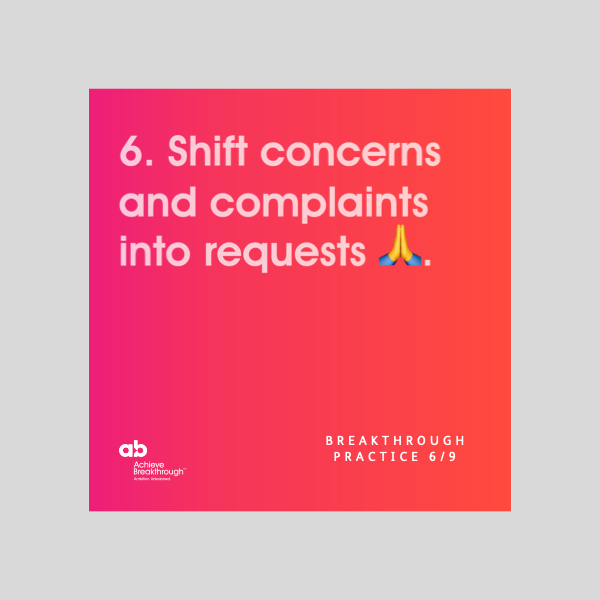Breakthrough Thinking Practice 6: Turning complaints into requests
Leadership Blog | 4 minute read

Written by Achieve Breakthrough

---------------------------------------
So far in this blog series we've discussed the five breakthrough practices:
- 1 – Unhooking yourself from your assessments
- 2 - Listening for what’s missing
- 3 - Identifying what you are really committed to
- 4 - Speaking your declarations publicly
- 5 - Acting from the future
---------------------------------------
In practice 6 we discuss how leaders can shift concerns and complaints into requests.
Complaining is part of the package when it comes to human nature and office life. But while all complaining may sound negative, it doesn’t always have the same effect. It might break the ice and build relationships, or it may help someone to offload and recharge, or it may lead to a conversation that goes round in circles for an hour. Over time, it can even hold leaders in a state of inertia for months on end.
So how do senior leaders break that cycle when they see it? Well, first it’s important to realise that there are three different types of complaining, and we need to distinguish between them. Once we know what we’re dealing with, we can help turn complaints into action at the right time.
Distinguishing between complaints
The first type of complaining is trivial complaining. This is designed for relationship building. It’s generally good for rapport building and creating a sense of togetherness. In excess it can negatively impact morale, but most of the time it’s harmless and a way of connecting with others. “Look at the dreadful weather today…” The watchout with trivial complaining is when it’s at someone’s expense, reinforces bias or is exclusive; at which point it’s more than trivial complaining. Trivial complaining in it’s true form is a harmless complaint designed to make conversation…it doesn’t require any coaching.
The second type of complaining is offloading. When we offload, we’re just looking for someone to listen to us. It’s a one-way kind of conversation. We’re not after advice and we certainly don’t want anyone offering us coaching – we may even flare up if someone tries.
It’s helpful to let people offload in moderation. It allows them to let off some steam and re-energise. If you’re unsure what type of complaint you’re facing, you can simply ask someone ‘are you just offloading?’ If they are, then all you need to do is listen.
The third type of complaining – committed complaining – is quite different. This is when circumstances are pushing up against what someone is committed to, and they really do want change. But instead of searching for a solution, they’re concealing their request behind a front of powerlessness.
How to respond to committed complaining
It can be easy for a leader to indulge someone’s committed complaining and join in – even in a way that is meant to be supportive and empathetic. But leaders must learn to resist taking this route. As more people gather around the flickering fire of a person’s frustration – sometimes offering condolences, other times advice – a lot of time can pass, and everyone can soon be burned by a collective resentment.
Instead, when faced with a committed complaint, the most helpful tool in a leader’s arsenal is a direct question: “what is your request?”
By placing responsibility back onto the complainer, you’re not saying that you don’t want to hear what they have to say, you’re just asking where the complaint is going. For if they can turn their complaint into a request, it creates space for positive action.
The person complaining usually doesn’t even realise they have a background commitment that is driving their complaint. But once prompted, and they’re free to discuss it, they may realise what’s driving them and, crucially, how action can be taken.
Frequent complaining isn’t great for morale, but if we can turn complaints into requests, they can become a useful way of identifying genuine set-backs.
To coach or not to coach
We’ve found that this works in all situations, no matter how trivial or serious.
If someone complains about something serious, empowering them to make a “if there were no-limits…” request is a good starting point for getting clear.
Or take a more minor matter: a leader complains they don’t have the budget required to achieve a target. Even then, you can ask them what their request is. Their request may well be that they want to speak to the finance department regarding this matter, and therein lies a solution to their complaint.
There is no one-size-fits-all approach to complaints. If someone’s manager has undermined them in a meeting, they may just want to offload and move on. Alternatively, they might want a three-way conversation with their manager and you as a senior leader, or they may want to get HR involved.
Asking what someone’s request is clarifies the situation. Either that they don’t have one, or that in fact action needs to be taken. It enables leaders to coach when needed, but it also stops them from inadvertently fanning the flames of irritation.
Crucially though, it’s an efficient way of ensuring concerns don’t escalate into roadblocks or official complaints later down the line. Because complaining is a natural part of working, and empowering people to find solutions is a natural part of leadership.
by Izzy Elvery
--
Looking to create an impossible future? Get in touch to explore how we can help you ignite your ambitions. Or start listening to our podcast Ambition. Unleashed. today.
Published 09/06/2022
Subscribe by Email
Achieve more breakthroughs. Get expert leadership ideas, insights and advice straight to your inbox every Saturday, as well as the occasional bit of news on us, such as offers and invitations to participate in things like events, webinars and surveys. Read. Lead. Breakthrough.
Tags
- Attracting talent
- Behaviour change
- Blended Learning
- Breakthrough Thinking
- Business partnering
- Career planning
- Change management
- Collaboration
- Communication
- Competitive strategy
- Creativity
- Decision making
- Developing middle management
- Developing millennials
- Developing talent
- Employee engagement
- Entrepreneurship
- High performing teams
- Hiring
- Human Resource Management
- Innovation
- Leadership development
- Learning technology
- Managing people
- Managing uncertainty
- Managing yourself
- Mergers & Acquisitions
- Mindset
- Motivating people
- Negotiation
- Organisational culture
- Organisational development
- Organisational values & purpose
- Performance management
- Productivity
- Programme Management
- Retaining talent
- Strategic thinking
- Strategy
- Strategy execution
- Succession planning
- Team development
- Work-life balance
Related posts
Leadership Blog
Why organisational agility starts with mindset, not operating models
Achieve Breakthrough | 17/02/2026
Leadership Blog
Curiosity as culture: The social glue of high-performing teams
Achieve Breakthrough | 10/02/2026
Leadership Blog
Why better questions build better teams: The cultural case for curiosity
Achieve Breakthrough | 03/02/2026
Leadership Blog
Leading with the handbrake off: Why curiosity is a strategic operating system for uncertainty
Achieve Breakthrough | 27/01/2026
